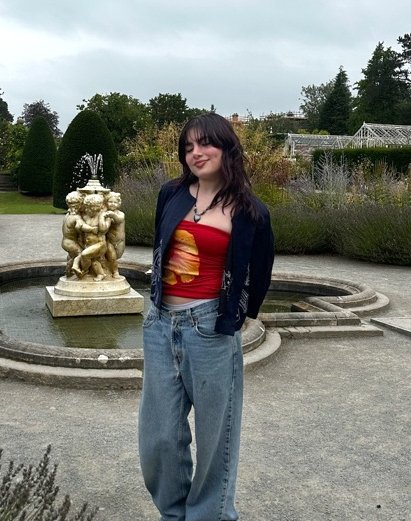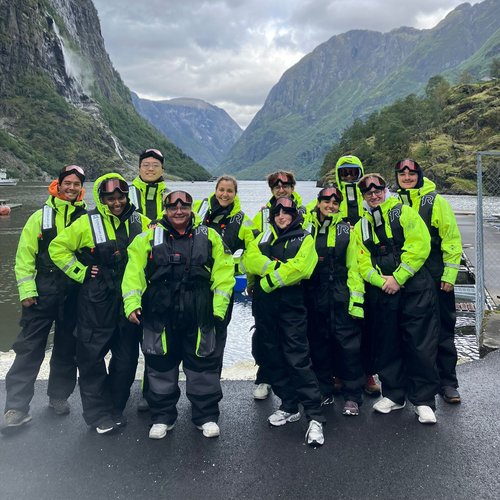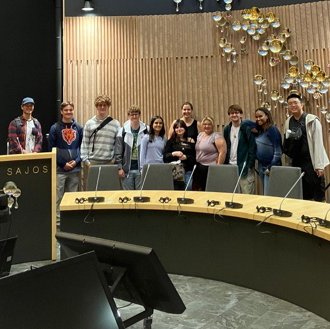
By: Valeria Martinez-Gutierrez
For my Fall 2024 semester, I decided to study abroad in London, and it was undoubtedly the most transformative experience of my academic career. From driving field studies in the Arctic Circle to working as a legal intern for a human rights legal charity – I explored and diversified my understanding of global narratives and had loads of good eats and fun!
I chose London due to the academically intensive field exploration within environmental justice – a career I intend to pursue using the knowledge of the intersectionality of my three majors: geography, sociology and environment, sustainability and policy. Being a Coronat scholar means that my financial woes are relieved while abroad which allowed me to fully immerse myself in the experiences of high-speed boating in the Norwegian Fjords, exploring the Sami parliament as well as engaging with Indigenous leaders and herders, as well as dissecting who benefits from sustainable infrastructure and who is left out in the latter during the 10-day pre-semester seminar, GEO 304: Sustainability on Trial: Environmental Justice in Northern Europe.

Traveling through the Arctic Circle while learning about global narratives of environmental injustice as a first-generation student was surreal; I developed a newfound interest in sustainable infrastructure while talking to city developers in Stockholm, who have optimized district heating to supply the town with renewable energy -- and the warmest shower I’ve ever taken!

Fall in London was beautiful, to say the least. I’d routinely walk through Victoria Park on my way to my internship with the AIRE Centre and admire the opportunity I was embarking on as the first person in my family to study and work abroad. My internship with the legal human rights charity, Advice on Individual Rights in Europe (AIRE) Centre, was an unpaid professional opportunity that I was matched with through Syracuse London and accepted into after an interview process. As a legal assistant intern, I was given (heavy) readings and handbooks in my first two days at the job which explained post-Brexit UK immigration policies and bylaws to assist in cases to apply for the EU Settlement Scheme (EUSS: the immigration system set to halt the free flow for EU citizens and beyond post-Brexit). Then, I applied the knowledge to the over-the-phone and email advice hotline, I solely handled in the beginning, to make cases, understand if one of the departments of the AIRE Centre could assist, and describe the case in a legally plausible narrative. I then spent most of my time assisting our EUSS solicitor in drafting Legal Advice, Support, and Witness letters/statements based on the facts of the client’s situation to support their late application to EUSS (applications were closed in 2020). I worked two days out of the week, Mondays and Tuesdays, from 10-6, and conjoined to the internship experience was BUA400: The Global Workplace, which I had on Tuesdays after work from 6:30-9:00. This class was refreshing as it taught me skills in networking, perfecting my CV and Resume, and even allowed me to interview a professional working in Green Finance, all of which were fascinating experiences that are often taken for granted. As a first-generation, I really appreciated learning Western etiquette attached to professionalism and the overall experience of leaving a good impression at your workplace. Working at the AIRE Centre was a once-in-a-lifetime experience, and I loved working with such passionate lawyers and co-interns that made London more welcoming.
Through another geography seminar course, GEO300: Science, Devolution, and Climate Controversies in the UK, we traveled to devolved country, Wales, and devolved rural council, Cornwall, to explain how devolution in the UK political system is influencing environmental management and climate action at the local, national, and global scale. The class was fascinating, and it was interesting how devolving power can even inspire different forms of architecture that most closely resemble the subcultural identities of the “British.”
These weekend trips and those that were school-sponsored, such as the ones I attended in Galway, Ireland, and Oxford connected me to wonderful people I’m grateful to call friends and made my small cohort feel familiar, especially in the absence of Latine culture in the UK. I mustn’t lie and say that the cultural transition was easy to adapt to, it definitely was a shift that took some getting used to. I felt culturally alienated from my Mexican identity and to reconnect I found a Mexican market and would often call my mom and grandmothers to cook traditional Mexican dishes to honor and reconnect with my culture. Being so far away made me appreciate my culture even more and without this experience, I wouldn’t have pushed myself to learn generational recipes.
The workload was completely manageable, and I only had three classes a week since my seminar courses knocked down six credits, therefore giving me the opportunity to stay involved in university clubs such as The Daily Orange, where I wrote bi-weekly. I also maintained a job with the Laredo Immigrant Alliance as a social media specialist! Going abroad was incredibly enriching and I’m forever thankful to the Coronat Scholarship for allowing me the financial opportunity and support to live out the dreams I’ve worked so hard to achieve, such as living in London -- as a student, and as a young person navigating a fascinating, new world. It’s often hard to stay committed to environmental justice when reflecting on our reality and getting educated on so many systems of violent intersectional oppression, but talking with the Sami, and seeing different visions of the possibility of our reality reignited my beaten passion for seeking environmentally just solutions for marginalized communities, like mine.
